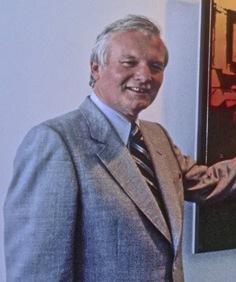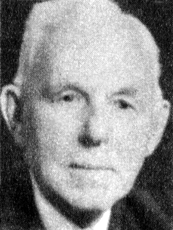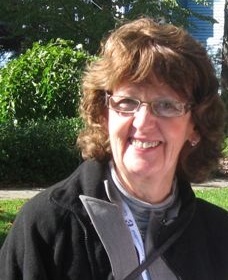William Ralph Brunt (October 24, 1902 – July 7, 1962) was a Canadian Senator and a close, personal friend and advisor of Prime Minister John Diefenbaker. [1]

John George Diefenbaker was the 13th prime minister of Canada, serving from June 21, 1957 to April 22, 1963. He was the only Progressive Conservative party leader after 1930 and before 1979 to lead the party to an election victory, doing so three times, although only once with a majority of seats in the House of Commons of Canada.
He was born in Hanover, Ontario, the son of a cattle drover and was educated locally. His final year of high school was at St. Andrews where he won the bronze medal for academic achievement. He then attended the University of Toronto and Osgoode Hall Law School where he earned his law degree in 1928. [1] He married Helen R. Richardson from Rosetown, Saskatchewan. They had two children, Flora Elizabeth ("Tibby") and William Ralph Brunt, Jr.

Hanover is a town in the Canadian province of Ontario with a population of about 7,650 residents. It is located in southwestern Grey County, bordering on Bruce County, west of Durham and east of Walkerton on Grey/Bruce Road 4. Hanover has a city hall, police department and the Hanover and District Hospital.
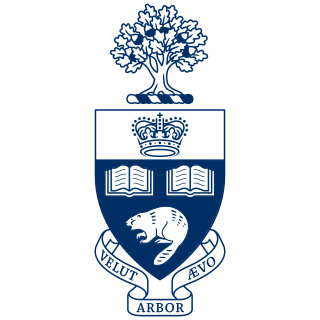
The University of Toronto is a public research university in Toronto, Ontario, Canada, located on the grounds that surround Queen's Park. It was founded by royal charter in 1827 as King's College, the first institution of higher learning in the colony of Upper Canada. Originally controlled by the Church of England, the university assumed the present name in 1850 upon becoming a secular institution. As a collegiate university, it comprises eleven colleges, which differ in character and history, each with substantial autonomy on financial and institutional affairs. It has two satellite campuses in Scarborough and Mississauga.

Osgoode Hall Law School, commonly shortened to Osgoode, is the law school of York University in Toronto, Ontario, Canada. The school was originally founded by the Law Society of Upper Canada, and named for William Osgoode, an Oxford University graduate and barrister of Lincoln's Inn who was the first to serve as the Chief Justice of Upper Canada. The school signed an agreement of affiliation with York University in 1965 following a decision by the provincial government requiring all law schools to be affiliated with a university.
Brunt, a lawyer by profession, was one of the Progressive Conservative Party of Canada's chief organizers in Ontario. He was appointed to the Senate by Diefenbaker in 1957, shortly after the Conservatives took power, and was deputy Government Leader in the Senate at the time of his death in a car crash. [1]

The Progressive Conservative Party of Canada (PC) was a federal political party in Canada.
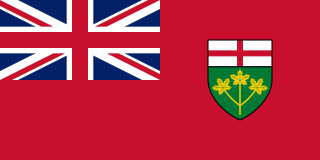
Ontario is one of the 13 provinces and territories of Canada and is located in east-central Canada. It is Canada's most populous province accounting for 38.3 percent of the country's population, and is the second-largest province in total area. Ontario is fourth-largest jurisdiction in total area when the territories of the Northwest Territories and Nunavut are included. It is home to the nation's capital city, Ottawa, and the nation's most populous city, Toronto, which is also Ontario's provincial capital.
He and Diefenbaker had been friends for decades and Brunt had backed Diefenbaker in his unsuccessful bids for the leadership of the party in 1942 and 1948 as well as his successful drive at the 1956 Progressive Conservative leadership convention. Brunt was one of a small circle of friends who spent election night in 1957 with Diefenbaker in his private railway car [1] and had been at Diefenbaker's side throughout the 1957 election campaign and was also a senior advisor to Diefenbaker during the 1958 election campaign that produced the largest majority government in Canadian history. [2]
The first Progressive Conservative Party of Canada leadership election was held in 1927, when the party was called the Conservative Party. Prior to then the party's leader was chosen by the caucus or in several cases by the Governor General of Canada designating a Conservative MP or Senator to form a government after the retirement or death of an incumbent Conservative Prime Minister.
